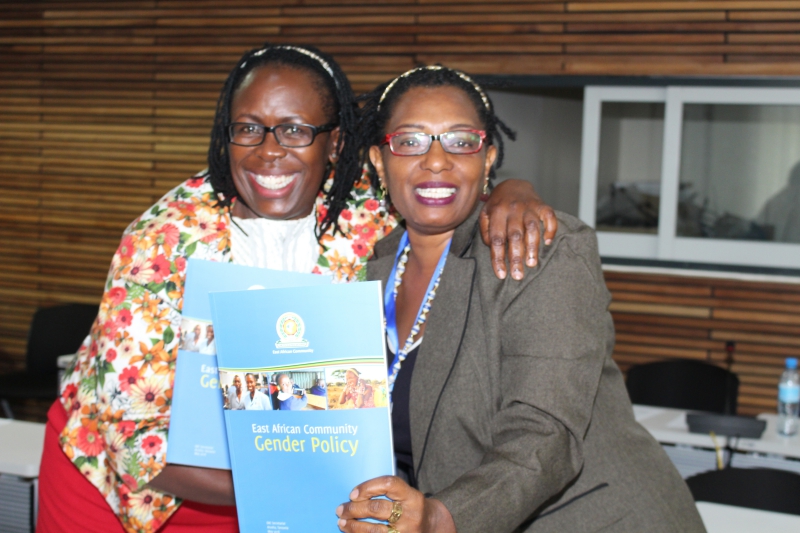
EAC launches Gender Policy
East African Community Headquarters, Arusha, 17th September, 2018: The East African Community Secretariat has launched Gender Policy that seeks an inclusive Community which guarantees equal rights and opportunities for women and men, boys and girls.
The EAC Gender Policy, which was launched at the EAC Headquarters, in Arusha, Tanzania has been developed to provide guidance on institutionalizing gender strategies in the EAC integration process in addition to ensuring that the rights of women and men, boys and girls are promoted, protected and realised on an equal basis.
The policy further aims at strengthening the mainstreaming of gender concerns in the planning and budgetary processes of all sectors in the EAC Organs, Institutions and Partner States.
Speaking at the opening session, on behalf of the EAC Deputy Secretary General in charge of Productive and Social Sectors, Hon Christophe Bazivamo, the Director of Social Sectors at the EAC Secretariat, Ms. Mary Makoffu, said that the Gender Policy was developed out of the recognition that there still disparities among men and women in various spheres of life.
“For example, despite various accomplishments by Partner States in educating the girl child, and possessing various skills by women and girls, there was poor representation of women in the employment sector and more so in political representation,” said Director Makoffu.
Ms. Makoffu informed the participants at the launch that there was still misleading data and contradictions between targeted programme interventions and those incorporating gender perspectives across different sectors.
“This lack of accountability delays progress in advancing gender equality and the empowerment of women, girls and other marginalised groups,’’ she said.Ms. Makoffu said that Gender Equality was a key principle of the EAC integration process.
She said that under Article 6 (d) of the Treaty for the Establishment of the EAC, Partner States committed to adhere to the principles of democracy, the rule of law, accountability, transparency, social justice, equal opportunities, gender equality, as well as recognition, promotion and protection of human and people’s rights.
Oh his part, Hon. Abdikadir Aden, Chairperson of the General Purpose Committee at the East African Legislative Assembly (EALA) informed the participants that in a bid to contribute to the quest for Gender Equality, EALA passed the EAC Gender Equality and Equity Bill, 2017 on Women’s Day of 2017 in Kigali, Rwanda.
Hon. Aden said it was expected that the Bill, when fully assented to, would give an unprecedented boost to the observance and practice of gender equality in the region.“I am informed that the training that has been organized to provide relevant knowledge, skills and values that will allow participants to contribute effectively in the implementation of the EAC Gender policy and all efforts at mainstreaming Gender in their respective organizations and in the Partner States,” said the legislator.
He congratulate the EAC Secretariat for this great stride of launching the policy and called for all the EAC Organs and Institutions to practice, encourage and advocate for Gender Equality.
Dr. Kirsten Focken, the GIZ Programme Manager, underscored the importance of the EAC Gender Policy as an instrument saying that it would bridge the gender income inequality gap that has existed for over two decades within the EAC region.
Dr. Focken, who was represented by Joyce Kimaro, Senior Adviser at the GIZ called for joint research among stakeholders on laws and regulatory environments which facilitate or hinder gender equality and women’s economic participation, and develop specific activities or interventions to remove the barriers in the region.
Notes to Editors
In 2012, the EAC Secretariat with support from the Society for International Development (SID) and the Eastern African Sub-Regional Support Initiative for the Advancement of Women (EASSI) commenced the process of developing the Policy. This was in compliance with the directive of the 25th Meeting of the Council of Ministers (EAC/CM25/Dir25) of August 2012 where the Council directed the Secretariat to develop policies on Gender Equality, Youth, Children, Social Protection and Community Development.
The EAC Gender Policy is anchored in Article 6 (d) of the Treaty for the Establishment of the EAC where Partner States committed to adhere to the principles of democracy, the rule of law, accountability, transparency, social justice, equal opportunities, gender equality, as well as recognition, promotion and protection of human and people’s rights in accordance with the provisions of the African Charter on Human and People’s Rights of 1986.
-ENDS-
For more information, please contact:
Mr Owora Richard Othieno
Head, Corporate Communications and Public Affairs Department
EAC Secretariat
Arusha, Tanzania
Tel: +255 784 835021
Email: OOthieno [at] eachq.org
About the East African Community Secretariat:
The East African Community (EAC) is a regional intergovernmental organisation of five Partner States, comprising Burundi, Kenya, Rwanda, Tanzania and Uganda, with its headquarters in Arusha, Tanzania.
The EAC Secretariat is ISO 9001:2008 Certified
